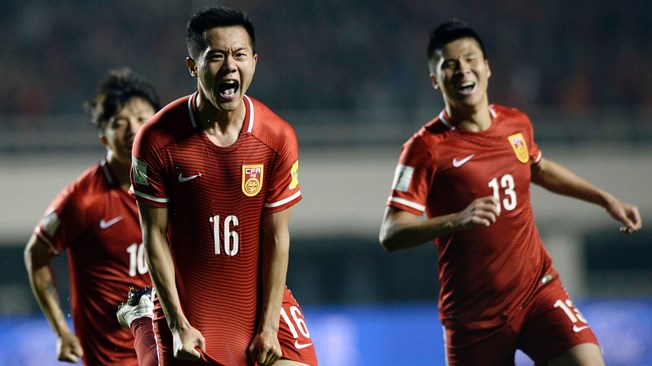Interview with Professor Simon Chadwick about Chinese football

*Professor Simon Chadwick is Professor of Sports Enterprise at the University of Salford in Manchester in the UK. He is well known as being a leading expert in the UK on the business of football. He was a founding Director of the Birkbeck Sports Business Centre, part of the University of London. Professor Chadwick has worked with numerous organizations involved in football, including Chelsea FC (social media), Adidas (strategy and football), FC Barcelona (overseas fan engagement) and Atletico Madrid (education programme development). Professor Chadwick also helped UEFA create its Certificate and Diploma programmes in Football Management.
Here I asked Professor Chadwick five questions relating to Chinese football. The questions cover both the development of football in China and the growing involvement of the Chinese in European football.
Question: What do you think are the prospects for a foreign club such as Manchester City to buy a club in China? What is the potential for a group such as City Football Group to develop a China based team branded along the lines of Manchester City FC, New York City FC and Melbourne City FC?
Answer: Credible sources have indicated to me that a franchise associated with the City Football Group will shortly be open in China. As stand-alone clubs, I think it is difficult for non-Chinese football teams to open-up new franchises in China. However, as with many decisions in China, there are always significant political and geo-political underpinnings to football-related activity. Given China Media Capital’s stake in Manchester City, as well as close relations between CFG’s Abu Dhabi owners and China, it seems almost inevitable that we will see the likes of Shanghai City or Guangzhou City being formed. For City, there are multiple benefits to be secured from this, which is the main driver of CFG’s franchise strategy. For China, a City club can be branded as a Chinese club and positioned in a way that demonstrates a commitment to the development of Chinese football.
Question: With most Chinese clubs currently adopting the policy of buying expensive foreign stars such as Carlos Tevez, Oscar, Hulk etc, do you have any thoughts on how Chinese clubs could adopt a more strategic and long-term policy when it comes to transfer policy?
Answer: Recent state interventions regulating the acquisition of overseas players has already begun to moderate the market – the 4+1 to 3+1 rule change is focusing the minds and strategies of Chinese clubs. In some ways, this is a good thing: if China is to become a leading FIFA nation, then it needs a sustainable flow of elite professional talent to be available to its football clubs. These clubs must take advantage of the opportunities the rule change is providing – they must now develop robust talent acquisition and development strategies. That said, China must get the balance right; foreign talent does serve a purpose: it helps raise and maintain the standard of football, it helps raise competence and skill levels, and it provides a point of engagement for fans.
Question: It looks as if China is aiming to host the FIFA World Cup in 2030. What do you think China needs to do in order to bring its stadia and other infrastructure up to the level required in order to host a World Cup? And do you think China would host a good World Cup?
Answer: In terms of infrastructure, there’s not a great deal for China to deal with: it has the stadiums, the roads, the railways, the hotels, the tourist attractions. Perhaps there could be some signature stadium developments; perhaps too, there may be some opportunities in the areas of fan parks and event experiences in which China could innovate. Put another way, China has already, and repeatedly, proven that it can host sports mega events. The bigger challenge for China will be to create a national team that will greatly outperform the China team that last appeared in World Cup tournament (in 2002). This suggests that Chinas need to look beyond the ‘hard’ aspects of football (like building stadiums) to the sport’s ‘softer’ aspects (like talent acquisition and development).
Question: Would you agree that Chinese clubs are making wise decisions in appointing some of the most promising young managers in world football, such as Fabio Cannavaro, Clarence Seedorf, Andre Villas-Boas and Gustavo Poyet? Or do you think that Chinese clubs should stick to hiring the experienced managers like Marcello Lippi, Sven-Goran Eriksson and Luiz Felipe Scolari?
Answer: There’s a balance to be struck; experienced managers bring a wealth of knowledge and expertise at the elite professional level, which China clearly lacks. Younger managers bring recent playing experience plus their insights are often at the cutting-edge, with many of them only having recently qualified as coaches. What China needs to ensure is that the people they hire have passion, commitment, and a desire to succeed…and not simply a wish to earn easy money from China’s increasingly affluent football sector.
Question: We have already seen significant Chinese investment in European football clubs, including in Man City, Atletico Madrid, Inter Milan etc. Do you think there is any possibility of Chinese investment in the historic English clubs Manchester United and Liverpool? If so, what can Chinese investment bring to English football apart from financial resources?
Answer: Recent calls by the Chinese government to curb irrational overseas football investments, allied to controls being enforced on overseas capital flows, have somewhat curtailed previous levels of investment. Moving forward, one suspects the Chinese government will require investors to establish a clear business case (and tangible ROI) before any overseas activity can be sanctioned. This tends to suggest that some of the bigger clubs will appear on the radar of Chinese investors, given the large revenue flows attributable to them as well as the geopolitical reach they can have. Liverpool, Manchester United and Chelsea would all fall into this category, and it is therefore unsurprising that rumours have been circulating about prospective Chinese acquisitions of all three. Based upon the experiences of a majority of European clubs now owned by Chinese investors, there seems to be a sense of stability and solidity to them. Beyond that, guanxi principles imply that there are broader commercial, industrial and geopolitical benefits associated with being a Chinese owned club.








